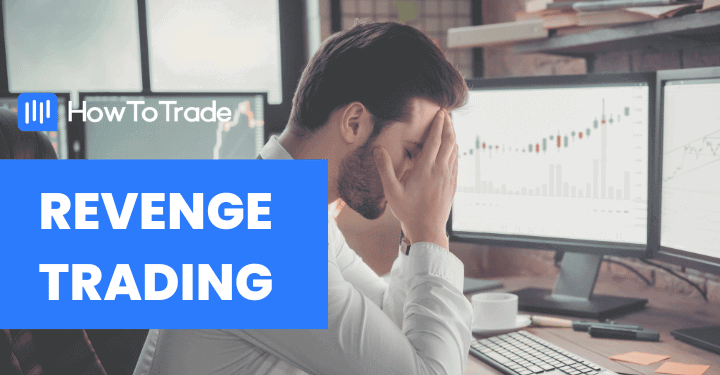
Have you ever found yourself in a trading slump, where nothing seems to be going your way, and you just can’t shake off the feeling of wanting to ‘get back’ at the market? Well, you’re not alone.
This is called revenge trading, and it’s one of the biggest obstacles traders face in their trading journey. Some might say that successful traders are those who know how to overcome revenge trading.
- Revenge trading is an emotional response to losses, where traders impulsively re-enter the market to recoup lost funds, often driven by frustration and ego rather than rational decision-making.
- It can lead to significant financial losses and damage a trader’s mental well-being, creating a cycle of impulsive decisions and further losses.
- The best ways to stop revenge trading include taking a break, reconnecting with your trade plans, trading on a demo account, or getting support from experienced traders.
So, this article is crafted from the wisdom of a decade-long trading career, offering insights, strategies, and a dose of hard-earned wisdom into the psychology of revenge trading and the strategies you need to overcome and avoid revenge trading.
 Table of Contents
Table of Contents
What is Revenge Trading?
Revenge trading is a term that resonates deeply within the trading community and is often a stark reminder of the emotional turbulence that can accompany the financial markets. As a seasoned trader with over a decade of experience in the financial industry, I have witnessed firsthand the detrimental impact that revenge trading can have on an individual’s portfolio, as well as their mental well-being. Revenge trading especially happens to many traders after a winning period or when traders try to increase their trading position size.
In simple terms, revenge trading is an emotional response to losses or a series of unfavorable trades. It is the act of jumping back into the market, not with a well-thought-out strategy, but with a burning desire to recoup lost funds. It’s the same as a bad day for a basketball player, a tennis player, or any other competitive field where you can simply not win.
Traders caught in the whirlwind of revenge trading are often driven by frustration and a bruised ego rather than rational decision-making. This trading behavior is closely tied to what we refer to as a ‘tilt’ in trading or the cycle of doom. Much like in poker, a tilt in trading occurs when an individual allows their emotions to cloud their judgment, leading them to make impulsive and ill-advised decisions. The desire to ‘get back at the market’ can be overwhelming, causing traders to throw caution to the wind and abandon their trading plans altogether.
The consequences of revenge trading are far-reaching, often resulting in significant financial losses and a damaged trading psyche. It is a cycle that can be incredibly difficult to break, as each loss fuels the fire of frustration, leading to more impulsive trades and, subsequently, more losses.
The Psychology of Revenge Trading
So, why is revenge trading not just common but almost a rite of passage for many traders, especially those new to the game?
Closing a losing revenge trade is never a pleasant experience. It’s a moment that stings, challenging not just your trading strategy but also your ego. Some people cannot close a losing trade because it hurts their egos. When you are closing a losing trade, you are saying: “I was wrong”. And we all know that some people simply cannot say it. The financial loss is obvious, but the blow to your self-esteem? That’s the hidden wound.
As traders, we enter the market with a desire to conquer, to prove that we can navigate the financial markets and come out victorious. So, when a trade turns its back on us, it’s not just a financial setback; it feels like a personal betrayal.
This is where the siren call of revenge trading begins to play its tune. There’s a voice in the back of your head, whispering, “You can win it back. Just one more trade.” It’s a seductive suggestion, promising not just a financial comeback but a chance to heal your wounded pride. And in that vulnerable moment, it’s easier than you think to give in.
But here’s the twist – revenge trading is a trap. It’s a cycle that feeds on your need for validation, pushing you to make rash decisions in the heat of the moment. Suddenly, you’re not trading with a strategy; you’re trading on pure, unadulterated emotion. And in the financial world, emotion is like bringing a knife to a gunfight.
So, why does this happen to you? It’s not because you’re weak or unskilled. It’s simply because you’re human. We’re all programmed to despise losing, to feel the burn of defeat.
At the core of every trader is a human being, with all the emotions, biases, and vulnerabilities that come with it. Every one of us, regardless of experience, can fall prey to these pitfalls that the market presents. Hence, recognizing this human element is the first step towards building resilience against revenge trading.
Then, you need to find a trading routine to help you avoid revenge trading and learn how to control the emotions that force you to trade.
Revenge trading is a trap. It’s a cycle that feeds on your need for validation, pushing you to make rash decisions in the heat of the moment. Suddenly, you’re not trading with a strategy; you’re trading on pure, unadulterated emotion. And in the financial world, emotion is like bringing a knife to a gunfight.
How to Stop Revenge Trading with Tools and Techniques
So, revenge trading is a trap that traders must avoid to become successful. But there are ways to solve this problem.
Let’s explore practical strategies to stop revenge trading in its tracks and foster a trading environment conducive to success.
1. Take a Break
The immediate aftermath of a losing trade can come with a lot of intense emotions and a burning desire to jump back into the fray to recoup losses. In these moments, the most powerful weapon you have is the ability to press pause.
The markets are full of trading opportunities, and a break can be beneficial for you. Physically distance yourself from your trading setup, engage in deep, mindful breathing, and allow yourself the time to decompress and regain composure in the next trading session. This intentional pause serves as a circuit breaker, interrupting the flow of impulsive decisions fueled by emotions.
When you eventually return to your trading desk, you’ll find that you’re able to approach the markets with a calm demeanor and rational mindset, ensuring that your decisions are made with precision and care.
2. Reconnect with Your Trading Plan
Every seasoned and successful trader operates with a trading plan and a roadmap that guides their decisions in the market. When revenge trading rears its head, it’s time to reconnect with your plan.
Scrutinize your trading strategies, reassess your risk management rules, and remind yourself of the trading goals you’ve set. This process is not just a reminder but a recommitment to your trading discipline and the structured approach that is necessary for long-term success. It’s a moment to recalibrate and ensure that every action taken in the market aligns with your overarching objectives.
And, if you see that your chosen trading strategy is not working, try something else. Luckily, you are not married to one trading strategy, and you can always try different things.
3. Analyze Your Losing Trades
Losses are an inevitable part of trading, but they are also invaluable learning opportunities. Instead of succumbing to the desire for revenge, channel your energy into dissecting what went wrong in the losing trade.
By using a trading journal template, you can pinpoint any errors in judgment or execution and develop a concrete plan to mitigate these issues in future trades. This shift in perspective turns losses into valuable lessons, setting the stage for growth and future triumphs in the trading arena.
For instance, if you notice the majority of your losses occur during the morning trading session, then try to avoid trading during these hours. Or, if you’ve identified some losses are made in a certain instrument, then stop trading it. Ultimately, identifying where most of your mistakes can help you become a better trader.
4. Trade on a Demo Account
If you find it difficult to resist the urge of revenge trading, the best course of action is to take a step back and create some distance from live markets where you can lose your trading capital.
A demo account offers a risk-free environment where you can hone your strategies, practice discipline, and regain a sense of mastery over your trading decisions. It’s a time for introspection and skill-building, ensuring that when you do return to live trading, you are armed with confidence and a renewed sense of control.
You can even try trading on an online trading simulator until you feel confident to get back on track.
5. Seek Support and Education
The journey of trading, while immensely rewarding, can also be isolating and challenging, especially when faced with a series of losing trades. It is in these moments that the value of a supportive community and continuous education becomes immeasurable.
If that happens, we highly encourage you to explore our trading academy, designed specifically to provide you with a nurturing environment where you can connect with experienced traders and like-minded individuals. Our trading academy offers a real-time glimpse into the strategies and decision-making processes of seasoned traders, providing you with invaluable insights and practical knowledge that can be applied to your trading journey.
For many traders, another way of avoiding revenge trading is to get advice from a trading professional is exactly what they need. That’s why our trading academy creates a holistic learning experience, fostering a sense of community and providing you with continuous support.
Engaging with our platforms enables you to learn from the successes and setbacks of others, share your own experiences, and receive constructive feedback, all of which are crucial for personal and professional growth.
Learn How to Avoid Trading on Tilt
In poker, players often speak of going “on tilt” – a state where emotions cloud judgment, leading to impulsive decisions and, more often than not, significant losses. The world of trading is no different. Just as a poker player might chase after lost chips, traders can find themselves chasing after lost profits, driven by a potent mix of frustration and ego.
Further, the parallels between trading and sports are evident: both require a keen sense of strategy, discipline, and emotional control. Just look at some of the best tennis players, like Federer, Nadal, and Djokovic. Usually, they have this mental strength, meaning they know how to control their emotions.
It’s the same in trading. In the end, trading is not just a test of your market knowledge and analytical skills; it’s a test of your emotional resilience. The ability to stay calm under pressure, to rise above the emotional turbulence of losses, and to trade with a clear and focused mind is what separates the novices from the veterans and from those who fail and succeed in their trading careers.
So, avoid trading on tilt, stay true to your strategies, and the world of trading will open its doors to endless possibilities and rewards.
Risk Disclosure: The information provided in this article is not intended to give financial advice, recommend investments, guarantee profits, or shield you from losses. Our content is only for informational purposes and to help you understand the risks and complexity of these markets by providing objective analysis. Before trading, carefully consider your experience, financial goals, and risk tolerance. Trading involves significant potential for financial loss and isn't suitable for everyone.



